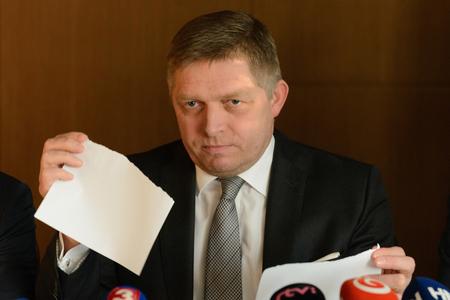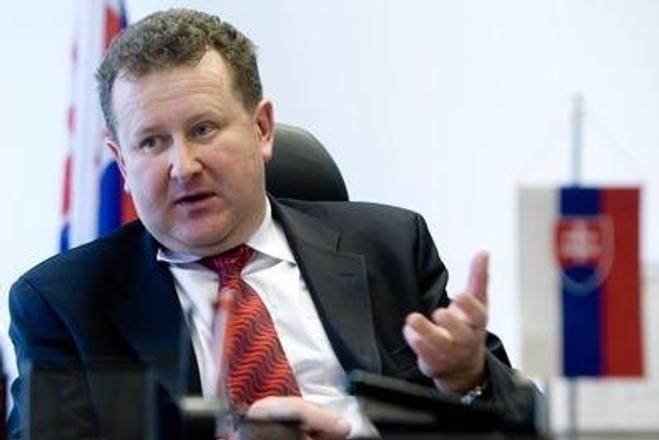First, the official regulator of utility prices revamped the composition of prices for electricity, natural gas and water without properly informing consumers what the impact would be on their final bills. Then, after consumers complained about steep increases, rather than the reductions in energy prices they had expected, Prime Minister Robert Fico intervened to demand lower prices. By apparently complying, the regulator has put its own independence in doubt – not for the first time.
“We [the cabinet] voiced fundamental political disagreement with the regulatory framework,” Fico said on January 18, adding that ministers had asked the head of the regulatory authority to offer a solution. Fico and his Smer party have made stable energy prices a key part of their political programme.

The head of the Regulatory Office for Network Industries (ÚRSO), Jozef Holjenčík, responded immediately with an offer to return utility prices to 2016 levels. ÚRSO issued a new regulation on January 25 to enact this.
“The regulator completed the price proceeding, which will remove discrimination against some consumers,” Radoslav Igaz, spokesperson of ÚRSO, said on January 26. “All clients of SSE-Distribúcia and SPP-Distribúcia will also get, on the basis of the new price decision, new upfront invoices from their suppliers.”
The way in which the head of the regulator responded so quickly to the prime minister’s intervention has raised concerns about its independence – not just among the opposition parties, but also with Smer’s coalition partners, the Slovak National Party and Most-Híd. The former has even called on Holjenčík to resign. The opposition Freedom and Solidarity party has gone further, and called on President Andrej Kiska to recall Holjenčík from his post.
Changes in utility prices
In final months of 2016, the regulator made significant changes to the composition of prices for electricity, natural gas and water. The changes came into effect at the beginning of this year. In general, they increased fixed fees within the end prices for utilities and introduced new tariff rates for final consumers. ÚRSO defended the change as an effort to encourage consumers to move into tariff categories that better reflect their final consumption of electricity and the associated real costs.
As Igaz explained, in the case of electricity, for example, many consumers, via their choice of tariff, reserve excessive capacity. This means that they order a much bigger supply of electricity that they actually consume. This causes problems for the grid and results in a lack of capacity for new clients.
However, the change in the composition of the electricity for end users, which apart from the fees for electricity as a commodity also consists of a plethora of other fees, including a so-called circuit-breaker fee, have led to steep increases in payments for some consumers.
Fico stated that out of three regional distributors, the change in electricity prices caused the biggest uproar in central Slovakia. This area is covered by electricity distributor SSE-Distribúcia, which is controlled by the Czech energy group Energetický a Průmyslový Holding (EPH). For the distributors in western and eastern Slovakia, a similar problem was not reported or was smaller in scale, according to Fico.
In central Slovakia the distributor increased the monthly circuit-breaker fee in the lowest tariff rate from €2.00 to €4.59 for a one-phase circuit breaker, and to €11.37 for a three-phase circuit breaker. In western Slovakia the fee increased from €2.35 to €2.78 for a one-phase breaker and to €5.93 for three-phase breakers, the Pravda daily reported.
As a result, ÚRSO applied its remedy only to SSE-Distribúcia. In the case of gas, ÚRSO also performed a nationwide U-turn when it reversed its price decision for gas distributor SPP-Distribúcia, which is also controlled by EPH. In the case of water, it sent water utilities a detailed manual on how to sort individual clients into tariff rates.
Calls for Holjenčík to be removed
Experts see the decision of the regulator to cancel its previous regulation as a very bad omen; Holjenčík’s independence has already been questioned several times in the past.
“It is an extremely bad signal that this environment is liable to political pressure,” said Peter Marčan of the Institute for Energy Security, as quoted by the Sme daily.
The opposition is calling for Holjenčík to be removed from his post. The Freedom and Solidarity (SaS) party even submitted an appeal to the office of the Slovak President to investigate the independence of the regulatory authority.
“We have a serious suspicion that this office is not independent and that it does not act as the law obliges it,” said SaS MP Jana Kiššová as quoted by the TASR newswire.
SaS regards Fico’s instructions to Holjenčík to re-evaluate ÚRSO’s original regulations for electricity prices in 2017, and his agreement to do so, as breaching the independence of the regulator.
“This is a real reason for dismissal of the head of the regulatory authority,” said Kiššová.
Others have voiced suspicion that Holjenčík has succumbed to the “lobbying pressure of companies”, to the detriment of consumers.
ÚRSO has denied all the accusations and is insisting that it remains independent.
Who is Holjenčík?
It was Robert Fico that proposed to then-president Ivan Gašparovič that Holjenčík be appointed as the permanent head of ÚRSO in 2012. At that time, he had already served as acting head of the regulator for five years. Holjenčík’s current term will lapse next autumn. Apart from the highest post at ÚRSO, Holjenčík also heads ÚRSO’s regulatory board, which deals with appeals against ÚRSO’s decisions.
It is within the sole power of President Kiska to dismiss Holjenčík. He can do so for several reasons, one of which is a breach of the independence of the regulatory authority. But the president’s spokesperson, Roma Krpelan, explained that the cabinet must first submit a proposal to do so.
While rumours that Holjenčík would resign from his post emerged after the problem with energy prices sharpened, ÚRSO later refused to comment on the reports.
The ruling coalition will now discuss Holjenčík’s future. On January 24, the Slovak National Party (SNS) called on him to resign, while Most-Híd said it is watching the situation, the energia.sk website, dedicated to energy issues, wrote.
“I have taken note of the political statement of the coalition partner,” Fico said, referring to the SNS call, as quoted by the website. “We will sit down with coalition partners and will solve this request objectively.”



 Jozef Holjenčík, chair of the Regulatory Office for Network Industries (source: Sme)
Jozef Holjenčík, chair of the Regulatory Office for Network Industries (source: Sme)